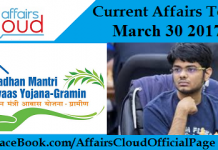Dear Readers, We cover some important news in Current Affairs Today Section, which are not covered in Daily Detailed News, More Current Affairs coverage will help you to Score Good Marks in Competitive Exams.
- Daily Current Affairs
- Try our Current Affairs Quiz 2017
- Read Our 2017 Current Affairs
- Current Affairs 2017 March
Click here to try Current Affairs Quiz : March 11 2017

INDIAN AFFAIRS
2017 Assembly Election Results of Uttar Pradesh, Uttarakhand, Punjab, Goa and Manipur
i. The Assembly Elections in the five states- Uttar Pradesh, Uttarakhand, Punjab, Goa and Manipur were considered the first big test for the BJP after Prime Minister Narendra Modi’s demonetisation drive, which wiped out 86 per cent of currency from the nation’s economy.
ii. While the Narendra Modi led BJP got a majority win in Uttar Pradesh which is considered as one of India’s most electorally crucial states, and snatched Uttarakhand from Congress, it suffered a loss in Punjab where its alliance with SAD was voted out of power.
iii. Bhartiya Janta Party(BJP) emerged victorious in state election of Uttar Pradesh.
iv. The BJP performed far better than expected to win 57 of the 70 constituencies in Uttarakhand
v. Congress’ candidates have won in 77 seats in the 117 member Punjab Assembly to get a majority win.
vi. Though none of the political parties managed to reach the majority mark of 31 for securing majority win in Manipur assembly polls, Congress and BJP were racing neck and neck.
vii. Congress emerged as the single largest party in Goa. It won 17 seats in 40 member Goa assembly. Though less than the majority vote to make government.
Arunachal Pradesh Finance Minister Presents Rs 285 crore deficit budget for 2017-18
The Arunachal Pradesh Finance Minister Chowna Mein presented a Rs 285 crore deficit budget for the 2017-18 fiscal in the state Assembly on March 10, 2017 with focus on women empowerment, infrastructure development and law & order.
♦ The budget mainly focuses on infrastructure development particularly road, health and education sectors, employment and skill development, law and order, rural economy, women empowerment.
Major Highlight of the Budget
♦ In the budget estimate of 2017-18, the state is projecting a revenue receipt of Rs 14,599 crore and a capital receipt of Rs 1,436.75 crore. This is an increase of over 15 percent from the budget estimates of 2016-17.
♦ The share of central taxes has been pegged at Rs 9,306.34 crore. The state’s own tax revenue is projected at Rs 742.94 crore and the non-tax revenue for 2017-18 at Rs 536.29 crore.
Allocations & Schemes
i. Arunachal Pradesh has announced to launch E-Office to move towards digitalization.
ii. JanDhan Accounts, Aadhar Card will be linked to provide citizen services, moving towards a cashless and paperless economy.
iii. To provide better IT facilities, Rs.15 crore has been proposed under the Digital Arunachal scheme.
iv. 15 crore has been proposed to develop industrial estates in the foothill districts.
v. 10 crore has been proposed under Arunachal Pradesh Budget 2017-18 for developing a food park at Tippi in West Kameng.
Rajya Sabha Passes Enemy Property Amendment Bill
Rajya Sabha passed a bill on March 10, 2017 by voice vote to amend a 49-year-old law regarding claims of succession or transfer of properties left by people who migrated to Pakistan and China in the 1960s or later .
♦ The Enemy Property (Amendment and Validation) Bill, 2016, which amends the Enemy Property Act, 1968, was passed in the Rajya Sabha to vest all rights, titles and interests over enemy property in the Custodian.
♦ The bill was passed by the Lok Sabha in March 2016 after which the Rajya Sabha had sent it to a select committee, upon whose recommendations the government had moved a number of amendments to it.
♦ Finally, after the amended bill was passed by the Rajya Sabha it was returned to the Lok Sabha for final passage.
Salient Features of the Bill
i. It declares transfer of enemy property by the enemy, conducted under the Act, to be void. This applies retrospectively to transfers that have occurred before or after 1968.
ii. The Bill prohibits civil courts and other authorities from entertaining disputes related to enemy property. It does not provide any alternative judicial remedy.
iii. The bill amends the definition of “enemy” and “enemy subject” to include the legal heir(s) or successor(s) of the enemy, even if the latter is a citizen of India or a non-enemy country.
iv. According to the new bill, the law of succession will not apply to the legal heir(s) or successor(s) of the enemy.
India’s Largest Floating Solar PV Plant Installed by NTPC in Kerala
i. State-run National Thermal Power Corporation Limited (NTPC) has installed India’s largest floating Solar Photovoltaic (PV) Plant at Rajiv Gandhi Combined Cycle Power Plant (RGCCPP) at Kayamkulam in Kerala on March 10, 2017.
ii. The 100 kWp floating solar generation plant has been indigenously developed as a part of ‘Make in India’ initiative.
iii. The Solar panels are mounted on floating boards that hold them in place. Installing solar panels in water bodies saves land as well as are more efficient than the ones installed on land.
iv. These floating platform were indigenously developed by NTPC Energy Technology Research Alliance, the R&D arm of NTPC in collaboration with Central Institute of Plastic Engineering & Technology (CIPET), Chennai and a patent has been applied for.
v. The system was installed by Swelect Energy Systems Ltd, Chennai with support from NETRA & NTPC Kayamkulam station in a short span of 22 days.
 Benefits of Floating Solar Photovoltaic (PV) Plant
Benefits of Floating Solar Photovoltaic (PV) Plant
1.Conserves water through reduction of evaporation
2.Increased generation due to cooling effect on the panels
3.Requires lesser installation time than conventional land mounted ones
4.The system could be installed on saline water environments also.
National Thermal Power Corporation (NTPC)
♦ Founded: 7 November 1975
♦ Headquarters: New Delhi
♦ Chairman MD: Gurdeep Singh
CBSE mandates six subjects for Class 10 boards from 2017-18
i. The Central Board of Secondary Education (CBSE) has made six subjects mandatory for class 10th standard board exams from 2017-18 instead of five subjects which includes two languages, social science, mathematics and science.
ii. The CBSE also make vocational subject as an additional course for class 10th students under the National Skills Qualifications Framework (NSQF).
iii. 13 vocational subjects are Dynamics of Retailing, Information Technology, Security, Automobile Technology, Introduction to Financial Market, Introduction to Tourism, Beauty and Wellness, Basic Agriculture, Food Production, Front Office Operations, Banking and Insurance, Marketing and Sales, and Health Care Services
iv. The marks obtained in the vocational subject will be considered when the student failed in any one of the three elective subjects
INTERNATIONAL AFFAIRS
Pakistan Introduces Constitution Amendment Bill to Revive Military Courts
i. The Pakistan’s Law Minister Zahid Hamid introduced two constitutional amendment bills in the National Assembly (lower house) on March 10, 2017 for the revival of the military courts that had ceased to function on January 7, 2017 after the expiry of their two-year term.
ii. The two bills introduced includes, the 28th Amendment Bill-2017 and the Pakistan Army Amendment Bill-2017.
iii. The first bill seeks to restore military courts, while the second is aimed at enabling trial of terrorism-related cases under the Pakistan Army Act 1952. The proposed amendment authorizes the military to try any suspect on terrorism-related charges.
iv .After adoption by the lower and upper houses of the parliament that is the National Assembly and the Senate respectively, the president will sign these into laws to revive the tribunals for another period of two years.
v. A similar amendment was adopted in 2015, the 21st (Amendment) Bill, 2015 and the Pakistan Army (Amendment) Bill, 2015, allowing military courts to carry out trials of militant 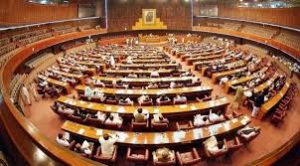 suspects for two years period.
suspects for two years period.
Pakistan
♦ Capital: Islamabad
♦ Currency: Pakistani rupee
♦ President: Mamnoon Hussain
♦ Prime minister: Nawaz Sharif
BANKING & FINANCE
Germany’s KfW signed loan agreement with EESL and SBI
i. The German Development Bank (KfW) and Uttar Pradesh based Energy Efficiency Services Limited (EESL) has signed a loan agreement for €200 million with a four year moratorium and a 12-year repayment period.
ii. This funds will be utilised for the planned expansion across all its portfolios of energy efficient products and services.
iii. Mumbai based State Bank of India(SBI) also signed an agreement with German KfW Development Bank for USD 274 million loan facility a maturity of 15 years to finance affordable housing segment in India.
KfW:
kfw is a German government-owned development bank which is owned by the Federal Republic of Germany (80 percent) and the States of Germany (20 percent)
♦ Founded 1948
♦ Headquarters: Frankfurt, Germany
Karnataka Bank, BAGICL sign MoU on general insurance business
i. Mangalore based Karnataka Bank has signed a Memorandum of Understanding (MoU) with Pune based Bajaj Allianz General Insurance Company for General Insurance business on March 10, 2017
ii. With this, Karnataka bank would be able to provide vast choice of non-life insurance  products to its customers.
products to its customers.
iii. This partnership will boost the growth of both organizations.
Bajaj Allianz General Insurance Company:
♦ Headquarters: Pune
♦ CEO: Tapan Singhel
♦ Founded: 2001
BUSINESS
Railways, UNEP sign LOI on environ initiatives
i. Railway Minister Suresh Prabhu and Executive Director of the UNEP, Erik Solheim have signed a Letter of Intent (LOI) with Nairobi based United Nations Environment Programme (UNEP) to formalise joint cooperation in the area of environmental conservation in Indian Railways.
ii. Objective of LOI :
1.Waste management
2.Reduction in water consumption and
3.Sustainable public procurement.
iii. This is a part of Indian Railways green initiatives for achieving 20% reduction in water consumption at railway establishments
iv. This joint co-operation will help to produce 1000MW solar energy.
UNEP :
♦ Headquarters: Nairobi
♦ Head: Erik Solheim
♦ Founded: 1972
APPOINTMENTS & RESIGNS
B.P. Kanungo appointed RBI deputy governor in place of R. Gandhi
i. B P Kanungo was appointed as deputy governor of Reserve Bank of India (RBI) for three years. He will take charge on or after April 3, 2017. He will replace R Gandhi.
ii. Kanungo’s appointment was approved by the Appointments Committee of Cabinet (ACC)
iii. He is currently working as Executive Director of RBI since March 2016.
India appoints Manjeev Singh Puri as next envoy to Nepal
i. Manjeev Singh Puri was appointed as the new Indian envoy to Nepal on March 10, 2017. He is the succeedor of Ranjit Rae.
ii. Presently Puri is working as the Ambassador of India to Belgium.
iii. He is a member of the Indian Foreign Service since 1982 and also a senior member of 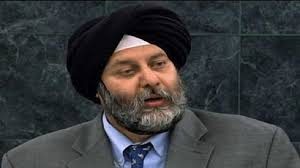 India’s Security Council team during 2011-2012
India’s Security Council team during 2011-2012
iv. He has served as the Deputy Permanent Representative of India to the United Nations in New York from 2009 to 2013.
Nepal :
♦ Capital: Kathmandu
♦ Currency: Nepalese rupee
SCIENCE & TECHNOLOGY
Venkaiah Naidu Inaugurates India’s Largest Waste-To-Power Plant in New Delhi
i. The North Delhi Municipal Corporation launched India’s largest municipal waste-to-power plant at Narela-Bawana in New Delhi on March 10, 2017.
ii. The 24 megawatt (MW) Narela-Bawana waste-to-energy plant was inaugurated by the Union Urban Development Minister M Venkaiah Naidu at the Civic Centre.
iii. The project has been developed on public private partnership model by Ramky Group, a Hyderabad-based waste management company, in collaboration with the North Corporation.
iv. It has been built at a cost of Rs 650 crore and over 100 acres of land.
v. The plant will use 2,000 metric tonnes of solid waste every day to generate 24 MW of energy. The capacity would be expanded further to process about 4000 metric tonnes of waste.
India Successfully Conducts Maiden Tests of Extended Version of BrahMos Supersonic Cruise Missile
i. India successfully test-fired an extended range version of supersonic cruise missile BrahMos from a test range off the Odisha coast on March 11, 2017.
ii. The land attack version of the cruise missile was test fired from a mobile launcher from the Integrated Test Range (ITR) at Chandipur near Balasore by Defence Research and Development Organisation (DRDO).
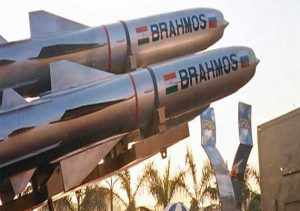 iii. The strike range of the missile has been enhanced from 290 km to 450 km and is capable of carrying a warhead of 300 kg.
iii. The strike range of the missile has been enhanced from 290 km to 450 km and is capable of carrying a warhead of 300 kg.
iv. The BrahMos missile derives its name from the Brahmaputra and Moskova rivers and was developed by an Indo-Russian joint venture after the two countries signed an agreement in February 1998.
v. The missiles can be fired on three different targets simultaneously. The land-based version is also equipped with an inertial navigation system and global positioning system (GPS).
vi .The technology upgrade to the extended range BrahMos comes after India gained entry into the 34-nation Missile Technology Control Regime (MTCR) in June 2016 which removed the caps on the range of the missile developed with the help of Russia.
vii. Another version of the missile with a strike range of 800 km is under development.
NASA’s Announces ‘Europa Clipper’ Mission to Explore Jupiter’s Moon
i. The National Aeronautics and Space Administration (NASA) on March 9, 2017 officially announced the name of its upcoming mission to explore the Jupiter mysterious moon.
ii. The mission to explore the habitability of Jupiter’s icy moon Europa will be called as Europa Clipper. The mission is being planned for launch
in the 2020s.
iii. Europa mission is a high priority for exploration for NASA because it holds a salty liquid water ocean beneath its icy crust.
iv .The objective of Europa Clipper is to determine whether Europa is habitable and possess all three of the ingredients necessary for life that is liquid water, chemical ingredients, and energy sources sufficient to enable biology.
Jupiter :
♦ Jupiter is the largest planet in the Solar System.
♦ It is the 5th planet in the Solar System, and the largest by far, easily visible in the night sky without a telescope.
ENVIRONMENT
Four States Jointly to Conduct Elephant Census in May 2017
i. The States of Odisha, West Bengal, Chhattisgarh and Jharkhand have decided to jointly conduct a synchronised Elephant census from May 9-12, 2017.
ii. A decision regarding the same was taken by senior Forest Department officials of the four States during a regional workshop on March 10, 2017.
iii. The dates have been selected as it is expected that sighting of elephants would be easier 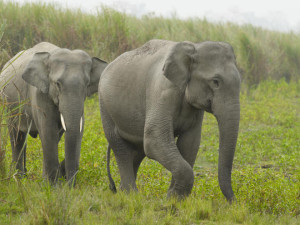 on the night of May 10 which is a full moon night.
on the night of May 10 which is a full moon night.
iv .The four States together have the maximum number of human-elephant conflict-prone regions in India.
v .The census will be conducted based on an identical set of rules by all the 4 states and using the direct and indirect counting methods.
vi. The direct counting method is based on sighting of elephants while the indirect method uses the ‘dung decay’ formula, in which the analysis of elephant dung is used to estimate the population
vii. As per the 2015 census, Odisha had 1,954 elephants, Jharkhand approximately had 700, Chhattisgarh approx 275 and West Bengal approx 130 elephants.
Scientists of CSIR-NIO Finds New Canyon System Close to Kovvada Coast
i. A team of scientists at CSIR-National Institute of Oceanography (NIO) in Visakhapatnam have discovered 3 new canyons in the depths of Bay of Bengal close to Kovvada in Srikakulam district, Andhra Pradesh on March 10, 2017.
ii. The 3 canyons forming a major canyon system was founded by the geologists with the help of state-of-the-art facilities on board RV Sindhu Sankalp research vessel.
iii. The ocean floor between Visakhapatnam and Srikakulam was clearly mapped for the first time by the researchers by sending over 32 high density beams to the depths of the sea.
iv. Canyon: A canyon refers to a deep and narrow valley that has steep sides. They are formed by the movement of the rivers, tectonic activity, weathering and erosion.
Feature of the Canyon System
♦ The new canyon system is very huge and formed by the river Kandivalasa.
♦ The depth of the canyon varies from about 90 metres from the starting point to about 2,500 metres at the deepest point.
♦ It extends to about 50 to 70 km deep into the sea and the width varies from 50 metres to two km.
♦ The scientists also say that the new canyons could be rich in hydrocarbons.
Previous Discovery
♦ The last canyon systems off the Visakhapatnam coast were discovered in 1963 by American geologist E.C. LaFond of U.S. Navy Electronics Laboratory on board research ship Anton Bruun.
♦ Prof. LaFond discovered three canyon systems between Viskhapatnam and a few kilometres north of Bheenumipatnam.
SPORTS
South African Surfer Makes World’s First Atlantic Crossing On Paddleboard
i. Chris Bertish, a South African surfer and a sailor became the first person in the world on March 9, 2017 to cross the Atlantic Ocean on a stand-up paddleboard after completing an epic 4,050-mile voyage alone at sea.
ii. 42 year old Bertish began his journey from Agadir, Morocco 93 days ago on December 6  and arrived at English Harbour, Antigua in the Leeward Islands of the Caribbean on March 9, 2017.
and arrived at English Harbour, Antigua in the Leeward Islands of the Caribbean on March 9, 2017.
iii. During his adventurous journey, Bertish had contended with sharks, storms and loneliness.
iv. Bertish travelled an average 44 miles a day and mostly at night to avoid exposure to the sun and alternated between resting and paddling every two or three hours.
v. He accomplished his journey on a custom-built 20ft-long board costing $120,000 (£99,000). The board was designed by a British boat designer and naval architect, Phil Morrison, and took six months to construct.
OBITUARY
Chemistry Nobel laureate George Olah dies aged 89
i. Hungarian–American chemist George Olah was passed away in in Beverly Hills, USA. He is 89.
ii. Olah received the chemistry Nobel prize for his work on carbocations in 1994.
iii. He also won the Széchenyi Grand Prize of Hungary and the American Chemical Society’s Priestley Medal.
Carbocation :
♦ A carbocation is molecule in which a carbon atom bears three bonds and a positive charge.
♦ Positively charged hydrocarbons such as methane could be stabilised using superacids, which allowed them to be prepared and studied using NMR and IR spectroscopy.
♦ This transformed the field of carbocation chemistry and it will produce important organic compounds
IMPORTANT DAYS
127th Foundation Day of National Archives of India observed
i. The National Archives of India celebrated its 127th Foundation Day on March 11, 2017 at Janpath, New Delhi
ii. An exhibition was organized on revolutionary patriots ‘Revolutionary Patriots (1905- 1947)‘ which display original documents and literature as a part of celebrations
1947)‘ which display original documents and literature as a part of celebrations
iii. Vindhyasharan Shukla presented patriotic poems in folk Alha format at the end of function
National Archives of India :
♦ National Archives of India is an Attached Office under the Ministry of Culture and established on 11 March 1891 at Calcutta .
♦ Professor G.W.Forrest was the first officer in charge of the department.


